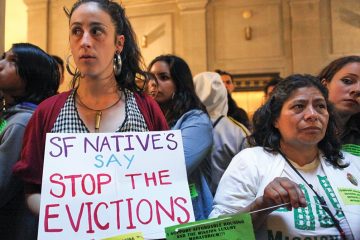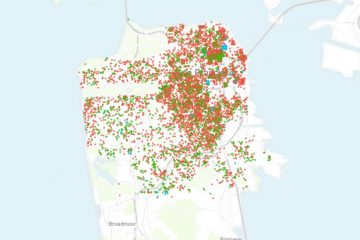Ask a Tenant Attorney: What is the San Francisco Rent Board?
Ask a Tenant Attorney is your chance to learn how to survive as a tenant in San Francisco. Tenant’s Rights Attorney Daniel Wayne has the information you need to keep you in your home. This month’s topic: How to Use the San Francisco Rent Board to get Money From Your Landlord. For more posts from Daniel check out his website at www.wayne-law.com. Have a suggestion for a topic you want Daniel to tackle? Send an email to alex@brokeassstuart.com and we will forward it on.
San Francisco Rent Board Explained
Many San Francisco tenants aren’t aware that there’s a separate administrative agency dedicated to solving their landlord/tenant problems. It’s true! The Rent Board (officially, the San Francisco Residential Rent Stabilization and Arbitration Board) is a catch-all city agency charged with interpreting and enforcing San Francisco’s Residential Rent Ordinance and providing resources, including free counseling and mediation services, to landlords and tenants. While Oakland, Berkeley, and other cities with Rent Ordinances on the books have similar agencies, we’ll be focusing on SF here.
Services
The San Francisco Rent Board provides three primary services to landlords and tenants: 1) Conducting hearings and mediations of tenant and landlord petitions; 2) Investigation of Reports of Alleged Wrongful Evictions; 3) Provide counseling to tenants on subjects covered by the San Francisco Rent Ordinance.
Tenant Petitions
The Rent Board oversees several specific landlord/tenant issues. Tenants can file petitions for the following issues:
- Substantial decrease in housing services (including failure to repair)
- Unlawful Rent Increases
- Rent Overcharge Claims from Subtenant against Master Tenant
- Improper passthroughs (including utilities, water bonds, capital improvements)
Filing a petition is the first step to begin proceedings at the Rent Board. Once received, the petition will be reviewed by Rent Board staff, who will then schedule an arbitration hearing or mediation session.
Additionally, tenants may file claims with the Rent Board for 1) Report of Alleged Wrongful Eviction; and, 2) Summary Petitions Based on Receipt of Invalid Rent Increase Notices. However, these two claims do not typically result in a hearing or mediation.
Landlord Petitions
Landlords can also file petitions against their tenants at the Rent Board. The most common are for:
- Rent Increases / Determinations on whether Unit is Tenant’s Primary Place of Occupancy (1.21 Petitions)
- Capital Improvement Passthroughs
- Operating and Maintenance Rent Increases
- Utility Passthroughs.
The Process
Because, in some cases, you may have claims that give rise to a potential lawsuit, it is always a good idea to discuss your situation with a tenant attorney or tenant counselor at one of the many non-profit housing organizations such as the SF Tenant’s Union or Housing Rights Committee as a first step. Likewise, if you receive notice from the Rent Board that your landlord has filed a petition against you, we recommend speaking to someone to get a better understanding of what you are dealing with and its legitimacy.
Filing a Petition:
Once you have determined you have an issue appropriate for the Rent Board the first step is to file your petition. Petition Forms are available on the Rent Board website. Whether to retain an attorney or represent yourself is a matter of preference as the Rent Board does not require that you be represented by counsel. The process and hearings are more informal than going to court.. Most landlords choose to be represented by an attorney, so tenants might consider securing representation in order to “even the playing field.”
From there, It often takes weeks for the Rent Board to schedule the hearing date. Therefore, for issues like improper rent increases it is always important to file your petition as soon as possible to ensure you get a decision as quickly as possible.
Responding to a Petition:
Regardless of the nature of your landlord’s petition you will have the opportunity to show up on the date of the hearing to challenge your landlord’s proposed action. Be careful to keep an eye on the mail for notice of the hearing date.
The Hearing: Arbitration vs. Mediation
Once a date is set by the Rent Board you will receive notice in the mail. The hearings take place at the Rent Board , 25 Van Ness, and are scheduled for a half day – either for morning or afternoon and are presided over by an assigned Administrative Law Judge.
Arbitration:
Depending on the nature of your petition your case will be assigned to either arbitration or mediation. In an arbitration, similar to being in Court, the parties each get an opportunity to present evidence supporting their position, including testimony from witnesses and the submission of supporting documents. Afterwards the Administrative Judge will consider the facts and issue a written decision. Typically the decision will be issued anywhere from 4 – 8 weeks after the hearing. After the hearing, the judge’s written decision will be mailed to all parties. If neither party appeals this ruling becomes binding.
Mediation (Alternative Dispute Resolution):
Alternately, your case might be assigned to mediation. What’s the difference? Rather than issuing a decision the Administrative Judge will work with you and your landlord to help you come up with your own solution to the conflict.
Because the parties are forced to work together, mediations can be a useful tool in restoring damaged relationships and encouraging the parties to communicate fruitfully. Also, mediations can be more efficient: because there’s no possibility for appeal, the agreement reached during mediation is final. If the parties can’t come to an agreement, their case may be scheduled for arbitration following their unsuccessful mediation. Note that mediation is commonly used for resolving decrease in services petitions but would not be appropriate in an illegal rent increase determination.
Research
The Rent Board is also a great research tool. If you are suspicious about the sinister past of your current (or a potential) landlord you can actually look them up at the Rent Board to see if they have had any previous disputes at the Rent Board. To do so simply stop by their office during business hours and ask for records relating to your unit address or landlord’s name. This type of search might bring to light a history of disputed rent increases, evictions, or previous tenant petitions– potentially useful information when you’re deciding whether to move into a new place, or strategizing for the best way to deal with a challenging landlord.
The Rent Board also maintains a database of tenant buyout agreements, searchable by neighborhood, which is available to the public. You have to go to the Rent Board itself to access this database, and you might keep in mind that this data set is incomplete: as not all buyouts are submitted to the Rent Board (though they are certainly supposed to be).
Drop-In and Phone Counseling
If you’re not sure which to petition to file, you have a question about rent control, or you just feel like chatting, the counselors at the Rent Board are available to speak in person or by phone. If your question is more involved or you need help with research, it might be worth it to visit their offices and talk to the counselor on duty.






